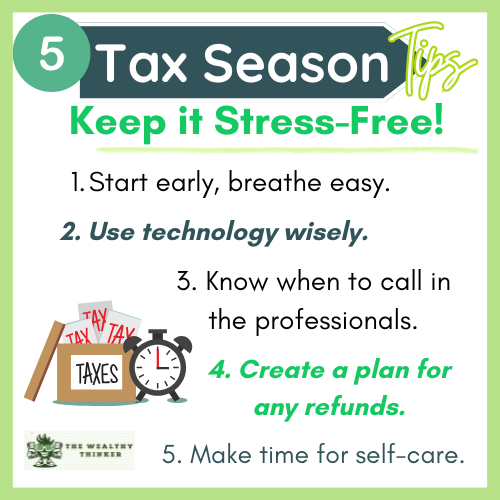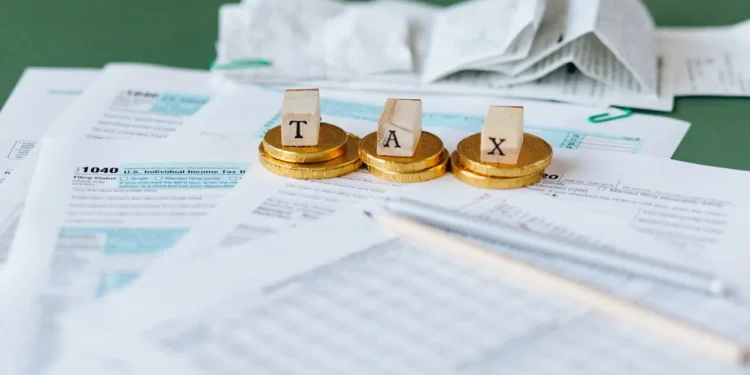As the calendar turns to a new year, those W-2s and 1099s start arriving in your mailbox, signaling that tax season has arrived.
For many, this brings a familiar knot of anxiety.
Whether you’re worried about owing money, confused by complicated forms, or simply overwhelmed by the process, tax season doesn’t have to be a nightmare.
Here are eight practical tax season tips to minimize stress and maximize your tax-filing success.

8 Tax Season Tips to Ease the Stress
1. Start Early, Breathe Easy
The single most effective way to reduce tax stress is to begin the process early.
Starting weeks before the deadline gives you a cushion for unexpected complications. Tax professionals consistently observe that early-bird clients experience significantly less anxiety than last-minute filers.
When you start early, you transform tax preparation from a dreaded marathon into a series of manageable sprints.
Set aside just 30 minutes a few times a week to:
- sort documents
- input information
- research deductions
This approach prevents the overwhelming feeling that comes with trying to complete everything in one exhausting session.
7 Terrible Ways to Use Your Tax Return
2. Create a Personalized Tax Hub
Disorganization amplifies tax stress considerably.
Create a dedicated “tax hub” – a physical or digital space where all tax-related documents live throughout the year. This might be:
- a labeled folder
- a specific drawer
- a digital folder on your computer
For physical documents, consider using a large envelope or expanding file with labeled sections for different categories:
- income documents
- deduction receipts
- investment statements
- last year’s return
For digital organization, tools like Evernote or Google Drive can help you maintain searchable tax document collections.
The most effective tax hubs include a personalized checklist of documents you expect to receive. This helps you track what’s arrived and what’s still outstanding, preventing last-minute scrambles for missing paperwork.
3. Leverage Technology Wisely
Tax preparation software has transformed the filing process for millions of Americans, but choosing the right digital tools requires some consideration.
Different software options excel at handling different tax situations.
If your tax situation is straightforward—typically just W-2 income and standard deductions—free filing options through the IRS Free File program might be perfect.
Those with more complex situations involving self-employment, rental properties, or significant investments might benefit from premium software with more guidance features.
Beyond tax preparation software, consider using financial apps that categorize expenses throughout the year, simplifying deduction-tracking.
Apps like CreditKarma, YNAB, or Expensify can export categorized spending reports that become invaluable during tax season.
The 6 Best Budgeting Apps to Download Now
4. Understand What Actually Triggers Audits
One of the biggest sources of tax anxiety is fear of an audit.
Understanding what actually increases audit risk can help ease these worries.
Contrary to popular belief, using tax software or e-filing doesn’t increase your audit risk – in fact, paper returns have higher error rates and may receive more scrutiny. Similarly, filing an extension doesn’t raise red flags with the IRS.
What does increase audit likelihood?
Significant discrepancies between your reported income and the information the IRS receives from employers and financial institutions.
Unusually large deductions relative to your income can also trigger questions.
The best audit protection is accuracy and honesty. Most audits stem from unintentional reporting errors or numbers that don’t match what the IRS already knows about your finances.
5. Know When to Call in the Professionals
There’s no shame in recognizing when your tax situation has outgrown your ability to handle it confidently.
Major life changes like marriage, divorce, buying a home, starting a business, or receiving an inheritance can dramatically complicate your tax picture.
Consider consulting a tax professional if you:
- started freelancing or opened a business
- bought or sold investment properties
- experienced significant investment gains or losses
- received an inheritance or large gifts
- had major medical expenses
- made significant charitable contributions
A skilled tax professional often saves clients more than their fee by identifying overlooked deductions and preventing costly errors.
For many, the peace of mind alone justifies the expense.
6. Create a Strategic Refund Plan
One often-overlooked aspect of tax preparation is having a clear plan for your refund before it arrives.
Without predetermined intentions, refunds can easily disappear into everyday spending.
Financial therapists recommend deciding what percentage of your refund will go toward financial goals before you even file.
Perhaps 50% to debt reduction, 30% to savings, and 20% for something enjoyable.
Having this framework prevents impulsive decisions when the money arrives.
If you typically receive substantial refunds, consider adjusting your withholding instead.
While many people enjoy the “forced savings” aspect of tax refunds, remember that you’re essentially giving the government an interest-free loan.
Adjusting your W-4 to reduce withholding could give you more money throughout the year for debt reduction or investments.
7. Prepare Year-Round for Next Tax Season
The most tax-savvy individuals know that preparation is a year-round activity.
Implementing simple systems in January can dramatically reduce next year’s tax stress.
- Create a tax-specific email folder where you save electronic statements and receipts throughout the year.
- For physical receipts, keep an envelope in a convenient location where you can immediately store documents with tax implications.
- Schedule quarterly “tax check-ins” on your calendar, where you spend just 30 minutes organizing recent documents and reviewing potential tax impacts of recent financial decisions.
These brief sessions prevent the document avalanche that typically occurs in tax season.
8. Practice Self-Care During Tax Season
Finally, acknowledge that tax season can be mentally taxing (pun intended).
Build specific self-care practices into your tax preparation schedule.
Financial therapists recommend that for every hour you spend on taxes, give yourself 15 minutes of something enjoyable afterward. This prevents the mental burnout that leads to procrastination and errors.
Whether it’s a short walk, a favorite snack, or a few minutes with a good book, these small rewards make the process more bearable while improving your focus and accuracy.
Tax Season Tips: The Bottom Line
Tax season doesn’t have to be synonymous with stress and anxiety.
By starting early, staying organized, understanding what actually matters, and giving yourself grace throughout the process, you can transform tax preparation from a dreaded ordeal into a manageable part of your financial life.
Remember that perfection isn’t required – just careful attention and honest reporting.
With these tax season tips in place, you might even find yourself experiencing something unexpected during tax season: a sense of financial empowerment!


















